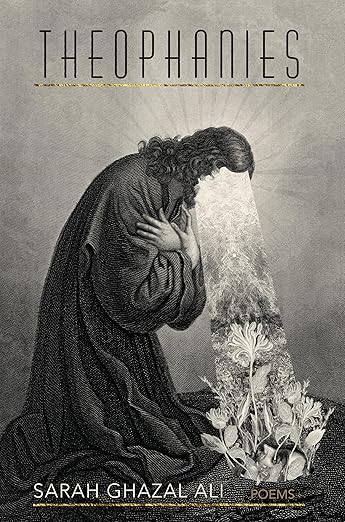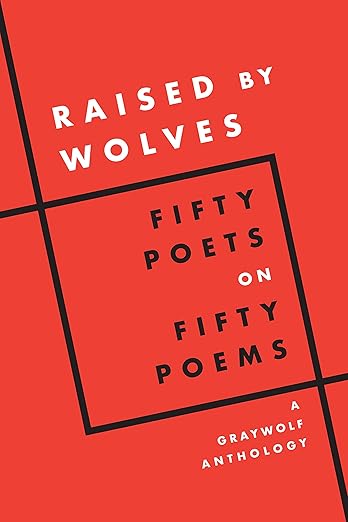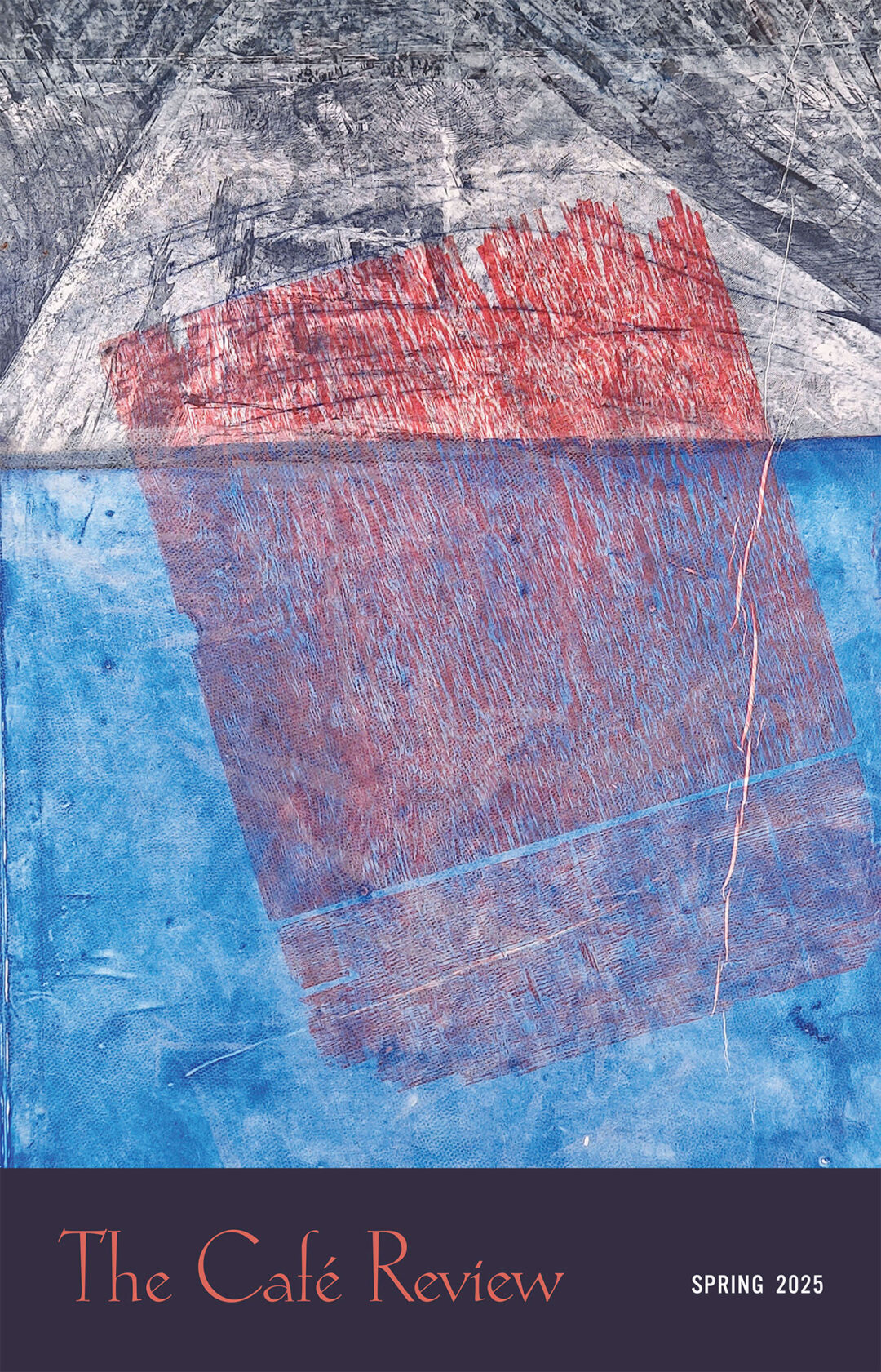Theophanies

Theophanies
by Sarah Ghazal Ali.
Alice James Books, 2024,
84 pages, paper, $24.95,
ISBN: 978-1-949944-58-7
After Sarah Ghazal Ali read “Matrilineage [Umbilicus]” on Poem-a-Day in October 2023, she explained that it was part of a sequence of poems “preoccupied with the mother line.” Elsewhere, Ali has stated that she is “obsessed with motherhood, daughterhood, sisterhood and the matriarchs in the Abrahamic faiths, specifically my namesake, Sarah.” This preoccupation and/or obsession drives the 41 poems in her debut collection, as powerful an entrance on the poetry stage as any in recent memory.
The opening poem, “My Faith Gets Grime under Its Nails,” begins with an admission: “I confess to sleeping coiled on my night- / blue prayer mat // more often than standing bent in rukū.” (In rukū, Wikipedia tells us, “the body is bent over until the hands are on the knees and remaining in that position until one attains a relaxed state while glorifying God.”) The poem goes on to further reflect the tension Ali feels with her faith:
The places I’ve prayed—elevators, Victoria’s Secret
fitting room, the muck-slick meadow after rain—
will testify for or against me,
spilling through my Book of Deeds.
Ali references figures from her faith: the evil spirit Shaytan (“Story of the Cranes”); Maryam, mother of Jesus (“Tumulus”); monotheism’s matriarch Hajar (“Spectacle”); and others. In each instance, the poet makes a personal connection that contemporizes these often-dominating personages.
In another alignment, Ali draws on her middle name, and the poetic tradition attached to it, in several poems. Loss of homeland inflects “Partition Ghazal” with every couplet ending with “country”:
Your father’s father watches from the walls,
a partridge falling from its sky of no country.
Ali’s ear for the music of words is everywhere in this collection. Take the first stanza of “Parable of Flies”:
I heard them, wings beating
a din beyond the thistle, pilgrims
beckoned by the promise of carrion.
The imagery matches the lyric cadence: “their mouths roved like dogs / the breast of a sundered wren”—stunning. She ends the poem with strong alliteration:
I’m divining my body a dirtied domestic.
When it rains, devotion is the womb
I’ve hollowed to keep desire dry.
“Roadkill Elegy” opens with this statement: “In good towns, good houses mourn what dies /outside by closing windows.” The speaker deals with her reactions—guilt, nausea—to thesedaily deaths. She also reflects on an innate cruelty: “In good towns, good children collapse /snake holes, heel away ant hills for sport.”
Ali’s range is remarkable, from the persona poem “Annunciation” to one prompted by Magritte’s 1934 painting “Le viol” (“The rape”). The poems “Apotheosis” and “When Nabra Hassenen Wakes Up in Jannah” pay tribute to, respectively, Noor Muqaddam, who was murdered in Islamabad, Pakistan, in 2021 for rejecting a marriage proposal, and Hassenen, the 17-year-old victim of a hate crime in Virginia in 2017. She cannot, as she has stated about Gaza, “scroll past the dead.”
“How a pen bleeds to grant shape to speech,” Ali notes in the title poem. Her writing expresses eloquently what it is like to live under the various sieges of existence, as daughter, sister, mother.
She is a brilliant shaper of speech.
–Carl Little
Raised by Wolves: Fifty Poets on Fifty Poems

Raised by Wolves: Fifty Poets on Fifty Poems.
Edited and published by Graywolf Press,
2024, paper, 136 pages, $18,
ISBN# 978-1-64445-266-0
In How to Read a Poem, Edward Hirsch describes the lyric poem as an unsettling, intense discourse between strangers. This discursive action animates the pages of Raised by Wolves: Fifty Poets on Fifty Poems, a new anthology from Graywolf Press. Celebrating the press’s half century of poetry publishing, fifty Graywolf poets each selected a poem from the press archives and also contributed a short essay. Gaining insight into one poet’s words by way of another, these essays artfully create a communal mosaic illustrating not only the many tessera of Graywolf’s aesthetics and ethos, but also the lively dialogue at the heart of the poetic endeavor.
Mesmerizers of time, place, feeling, mood—poetry can encode messy immensities, folding worlds within words like accordion bellows. Hirsch describes poems as having “stored magic.” Many essays in Raised by Wolves reckon with this magical energy. Where does it reside in the poem? What does it evoke, how does it move through?
For example, Saskia Hamilton’s poem “Faring” creates a meandering cityscape, noting and noticing many scenes – from children playing in the neighborhood, to waves of post-pill nausea, meteorology’s changing moods, musings of an 18th century poet, and more: “In the streets below, each passersby carries time internally, it opens the mind like a flower blown in its native bed.” Claudia Rankine writes that Hamilton’s poem “builds its rooms against the ‘toomuchness’ of life, life’s actual, red-hot intensities.” Language and experience are co-constituted through poetic practice, giving expression to the difficult and often incalculable.
Ilya Kaminsky reflects on how Vénus Khoury-Ghata’s figurative language in “She Says,” where she builds new myths in the wreckage of war, “feels like a beautiful construction that might otherwise need to be expressed by a scream.”
Language is often the tool of oppression, Monica Youn reflects. But in reading Mullen’s poetry, Youn sees language used to “undermine, excavate, perforate, dislodge, renovate—hollowing out breathing space, elbow room, fashioning a home within an often inhospitable tradition,” as in Mullen’s “Trimmings”: “Mistress in undress, filmy peignoir. Feme sole in camisole. Bit part, petite cliché.[…] Negligent in ladies’ lingerie, a dressy dressing down.”
Layli Long Solider writes about power and agency in poetry, particularly for marginalized poets around issues such as disclosure, exposure, and vulnerability. Long Solider includes a handful of lines from Solmaz Sharif’s poem “Personal Effects,” where, following a blank space on the page, Sharif describes a photo and the young casualty of war it depicts. Long Solider writes, what is left off the page “may vibrate at a higher frequency than what’s on the page. These choices are the poet’s agency—or better yet, a form of sovereignty. Withholding is a way of saying, you cannot see this, know this, or take this; it’s an assertion of immeasurable integrity.”
In “The Forest,” Susan Stewart writes: “You should lie down now and remember the forest, / for it is disappearing— / no, the truth is it is gone now / and so what details you can bring back / might have a kind of life. // Not the one you had hoped for, but a life.” Jennifer Gratz writes that this poem “has haunted me now for nearly thirty years.” Stewart was inspired to write “The Forest” after hearing that a time may come when no one will remember the experience of a forest. “A chilling thought,” Gratz writes, “one we all live with still.”
Folding time, sharing experiences, holding attention – the poem’s magic is surfacing. The poem “reads as incantation, as spell, revering the forest by recreating its wildness in its own form,” Gratz reflects, later describing how it “weaves a mesmerizing reading experience of simultaneous familiarity and disorientation, of being ‘tangled’ and, in the end, ‘lost’ in the forest—and lost in the forest of the poem, too.”
What magic indeed, drawn in through discourse, ensnared in shared moments amongst strangers.
–C.T. Wolf
You Bombed!!!

by Greg Cotter
Around 1988
at my hottest
Diane Wakoski arranged a reading for me
at a bookstore in East Lansing
6 years after I’d graduated.
*
Uncertain about poetry
the obvious solution:
get drunk before the reading
*
After,
Diane and Robert held a party at 607,
exquisite wines, liqueurs, appetizers.
(Diane used to say, “No one really wants poetry,
you have to draw them in with food and drink.”)
They put on hundreds of such poetry events
in East Lansing over the decades.
*
I’d driven from LA
and was staying with Diane and Robert
in their basement apartment.
The next morning I walked upstairs
barefoot in jeans and T,
throbbing headache, bleary-eyed,
shoulder-length hair matted to my face—
Diane met me at the top of the stairs and yelled,
“You BOMBED!!!”
This was one essence of Diane
I’ve always loved:
no wasting of time,
no platitudes or false reassurance.
*
This week, 40 years later, she said,
“You’ve seen my volcanic temper,
but I recover quickly.”
And later that evening,
sitting in her living room,
bamboo furniture with yellow cushions,
D with red wine,
me the Evil Wied,
she said, gently,
“Your poetry is a jolt—
it can be difficult.
I appreciate the beauty and honesty of your reading.
It’s what we needed to hear.”
Michigan Fort

by Greg Cotter
We built forts with pieces of scrap lumber
from our fathers,
building sites,
woods and fields.
*
One morning when we got to the field
one of our best forts, three rooms, gone.
Not a sliver of wood left.
Wondered about the Showers boys.
*
Our next plan:
build underground.
We dug a hole
big enough to hold two VW Bugs,
hit water 5 feet down.
Cut shelves in the walls for candles,
plywood to cover,
camouflaged with plants and leaves.
*
Over a half century later
this three-storey condo,
what we wanted in our forts,
running water, electricity, furniture.
It was like 17-year-old Jeremy
using a figure-of-speech I didn’t understand,
“Catch a double, man.”
Each generation preparing for the next fort.


